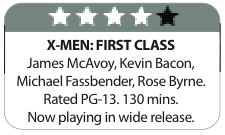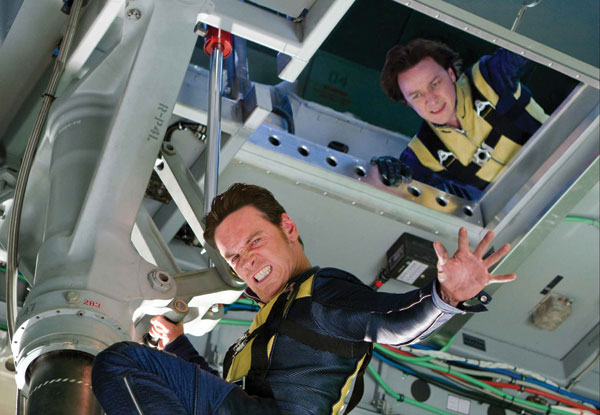Mutants-as-metaphors? The pro-gay message is unmistakable in ‘X-Men’
ARNOLD WAYNE JONES | Life+Style Editor
jones@dallasvoice.com
2011 is becoming the summer of supers. And it is a Marvel.
We’ve already had Thor, and before July is over, we’ll have Green Lantern and Captain America. But it will be remarkable if any manage to outdo X-Men: First Class. More than a kiddie version of an established franchise, this prequel has the scope of a Bond film and touches on serious issues like Nazi camps, nuclear annihilation and homophobia. First Class is that rarest of summer movies: A socially conscious superhero comic.
In 1944, pre-teens Erik Lensherr and Charles Xavier are leading vastly different lives. Charles lives in a castle on Long Island with his wealthy family, using his psychic powers to carve out an academic career. Meanwhile, Erik finds his ability to control metal with his mind is put to sick use by a Nazi doctor Sebastian Shaw (Kevin Bacon) while his family is butchered in a concentration camp.
 Eighteen years later, Charles (James McAvoy) and Erik (Michael Fassbender) team up, united in their efforts to stop Shaw (himself a mutant of intimidating power) from starting WWIII, in a sophisticated good cop/bad cop routine where they recruit new young mutants to join their cause.
Eighteen years later, Charles (James McAvoy) and Erik (Michael Fassbender) team up, united in their efforts to stop Shaw (himself a mutant of intimidating power) from starting WWIII, in a sophisticated good cop/bad cop routine where they recruit new young mutants to join their cause.
The X-Men have been about outsiders not fitting in since the comics debuted in the 1960s, but it has been since the film series started in 2000 that the obvious parallels between mutant and gay have been most apparent. That’s true even in First Class, set long before the gay rights movement began.
“I didn’t mean to out you,” one character says to a secret mutant, who justifies not telling his boss by saying, “You didn’t ask, I didn’t tell.” “I’m not the only one who is different,” one confesses tearfully. There’s just no way that’s a coincidence.
Especially not with Matthew Vaughn directing. The last four X-Men movies have been directed by capable but quick-to-go-commercial directors, but Vaughn is a savvy, thoughtful director who composes more than he stages. Vaughn has an artist’s ethos, as he proved with his debut feature, Layer Cake, and demonstrated subsequently with the smart, edgy actioner Kick-Ass last year. His style oozes classic craftsmanship (one scene, set in a bar, generates incredible tension as Tarantino did in a similar set piece in Inglourious Basterds, though in an abbreviated version).
There’s an efficiency of storytelling, couched within the conventions of the superhero “origins” format, that’s admirable. It took George Lucas three full films to explain what circumstances made Darth Vader who he was; Vaughn does it in two hours. Of course, Lucas was hamstrung by having to use Hayden Christensen as the conduit for telling that story; First Class benefits from Fassbender’s sexy bravado as Magneto.
For the film — for the series — to work, you need to like Magneto a little to understand how he became a villain. Fassbender is sympathetic and reckless, and when he finally begins to believe in how the cause of mutants must supersede those of humanity, it’s difficult not to detect traces of Larry Kramer and ACT UP! in his passionate, separatist radicalism. It’s enough to make you wanna hold up a sign saying “Mutant and proud.”
Bacon is an unusual but effective choice as the supervillain, though January Jones, in a sexy, Bond-Girl-with-Balls cheesecake performance, more than holds her own.
Ultimately, it’s the message of being virtually normal — that is, redefining the baseline for what normal is — that makes the entire X-Men franchise resonate so strongly with modern, enlightened audiences. That’s especially true here. First Class is just that … in every sense.
This article appeared in the Dallas Voice print edition June 3, 2011.

















To say that George Lucas “was hamstrung” by HAVING to use Hayden Christensen as the conduit for telling his Star Wars story is wrong. George Lucas HIRED Hayden Christensen out of a sea of young actors who had given auditions. I’m positive that if he had not liked Hayden’s acting or performance he most certainly would have gotten someone else, it was after all his perogative – George Lucas owns that story. It’s entirely rude to put the entire Star Wars mishaps on the shouders of a nineteen year old who was hired to do a job (which he did and did it according to the specifics of George Lucas). That is what you and a lot of other “writers” are doing when you refer to Hayden Christensen in such a negative manner. Get REAL, Star Wars is and was George Lucas’ baby. He was going to tell the story his way, have it acted his way, have the CGI done his way and he did. After all it was HIS story. Who else but George Lucas could get away with having the first prequel movie about a 10 year old kid and a “pod race”, and it would be seen by almost a billion people? Writers who have ridiculed Hayden’s career by these remarks, ALL owe him a huge apology. He’s an excellent actor who has proved his talent before, during, and after those prequels – he received a Golden Globe nomination for Life As A House and he and Peter Saarsgard both received best actor awards for Shattered Glass. THAT does not happen, if you “hamstring” directors and just WHAT Hollywood director would actually ALLOW himself to be “hamstrung”, really, especially a director with as much clout as Lucas has! Think before you type on that computer or better yet, actually investigate an actor’s body of work before you draw such a conclusion. IF you writers would take the time to view the 12-14 movies Hayden has made, and I mean the entire movie not just two minutes worth, you would realize what a talented individual he is. It has been ten full years since the preguels were made and it’s TIME to let go of the fact that George Lucas decided to hire a Canadian actor, with Hayden’s obvious talent no one cares about that but Star Wars purists who decided on their own to hate him whether he was good or not. It’s time to mature, time to let it go and just thank George Lucas for making the movies that we all enjoy and love so deeply.
The first two X-Men movies, directed by Bryan Singer, were similarly laden with GLBT themes. Singer is as good a director as Vaughn, and is also openly gay.